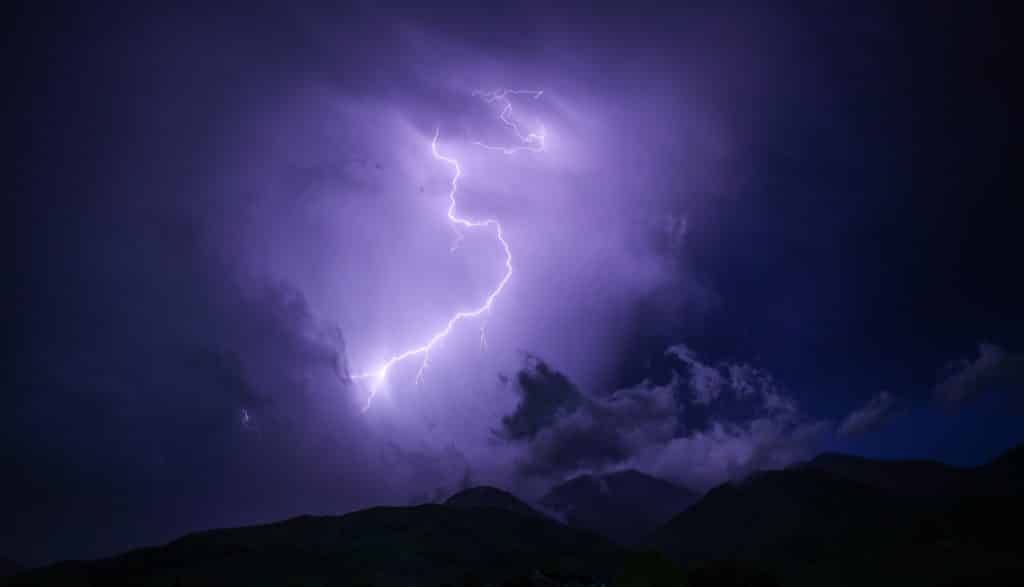-

From outage maps to other useful tips, learn how to deal with power outages in Canada (Photo: Cory Woodward on Unsplash)
What to Do When the Power Goes Out
From Nova Scotia to British Columbia, anyone in Canada is vulnerable to power outages. Whether a planned maintenance appointment or an emergency issue, a power outage is always a complication, and it can affect your day-to-day life in several ways. That’s why it’s important for people to know what to do about them and how to reduce their damage.
In September 2018, a tornado hit the Ottawa and Gatineau regions, and left nearly 100,000 households and businesses without power for hours. This is an extreme example, but there are countless possibilities when it comes to energy outages. Be it due to a storm, a falling tree or a raccoon that entered the wrong place at the wrong time, electricity cutoffs can be very unexpected. Yet, there are steps we can take to reduce the duration of power outages and limit their effects.
Below, you can check a complete guide on what to do during power outages, how to prepare for them (when possible), how to contact your power company and how to track power outages using their outage maps.
Why do power outages happen?
Have you ever asked yourself what causes a power cut at home or anywhere else?
If not, know that the first step of preparing for power outages is to understand why they happen.
We are used to seeing electricity issues as random power cuts, but there are only a few episodes responsible for the vast majority of power outages, according to the Canadian Department of Public Safety and Emergency Preparedness. Most of them will be over in seconds, but some of them may last a surprisingly long time.
Freezing rain in the winter, heat waves in the summer or even high winds during spring — reasons may vary, but basically, power outages are caused by seasonal damage to power lines. In April 2018, for example, winds of 90 kilometres per hour (km/h) hit the Greater Toronto Area (GTA) and left more than 80,000 people without power for hours.
If you’re curious about the main reasons why power outages happen, you will enjoy BC Hydro’s page for facts and numbers related to electricity cuts. According to the British Columbia power provider, the leading causes of power outages are:
- Trees: 33%
- Adverse weather: 21%
- Unknown: 5%
- Equipment failure: 9%
- Other (vandalism and foreign objects): 9%
- Planned outage for maintenance: 5%
- Motor vehicle accidents: 5%
- Birds and animals: 5%
- Adverse environment (fire, industrial pollutions and floods): 2%
-

Storms and adverse weather are two of the main causes of power outages in Canada (Photo: Layne Lawson on Unsplash)
-
How to prepare for power outages
In the comfort of our day-to-day lives, sometimes we forget how annoying power outages can be — and that we should be prepared for such a possibility.
A whole city can grind to a halt without power, which includes basic services at work, at school or at home. Still, there are many things we can all do to make sure we’re not caught unprepared by power outages. Yes, they will still be tedious and inconvenient, but won’t be as harmful as they can be. According to the Department of Public Safety and Emergency Preparedness, families should be prepared to deal on their own during an outage for at least 72 hours.
Don’t know where or how to start? We’ve got you covered with some quick tips on how to prepare your home for power outages.
- Elaborate an emergency plan with step-by-step measures.
- Create a list of emergency contacts (from fire rescue to loved ones).
- Always have a kit with nonperishable food, lights, flashlights, batteries and water.
- Make sure the emergency kit has enough resources to last for at least 72 hours.
- Have candles, matches and lights in an accessible distance.
- If you use battery telephones, make sure to buy a backup wired model.
- Purchase extra batteries and power banks for your main electronic devices.
- Use surge protectors to prevent damages to your appliances.
- Avoid the elevator if you notice power is unstable.
- In case of special medical needs, always have a power supply.
What to do during a power outage
Whether you were prepared or not, there are some tasks you should do during a power outage to prevent you from major problems.
- If your home depends on electricity for heating or cooling, consider going to a place with safe temperatures.
- Don’t use a gas stove to heat your home.
- In case you need to leave due to floods, fires or storms (and have time to do so), clear valuables of the house.
- Don’t overuse flashlights, cell phones and other battery-powered devices. You don’t know for how long you will need them.
- Don’t open your freezer or fridge unless it’s highly necessary. A freezer should be able to keep products frozen for about two days.
- If possible, cook some of the perishable food you have.
- Turn off all the electronic equipment due to electrical surges.
- Contact your electricity supplier.
- If your neighbours have power, check if your circuit breaker and main fuse are working normally.
- Turn on the safety lighting.
- Place the candles in a safe place to avoid accidents.
- Keep an eye on the news; it’s useful to have a radio or a cell phone near you so you can check what’s going on outside from time to time.
How to report a power outage to your utility provider in Canada
“OK, power is out. Who do I call?” Well, once you investigated the issue at home and there is nothing out of normal happening there, you should consider calling your electricity company to let them know you have no power.
Most electricity providers in Canada have emergency phone numbers on their websites or printed on your electricity bill, so it shouldn’t be difficult for you to find it. Some of them have online services such as “Finding and Restoring Outages,” “Report an Outage,” “Outage Alerts” or “Service interruptions” for customers not only to report issues, but also check the status of each outage.
Considering a substantial part of power outages are done in a few minutes, you won’t probably even need to call your electricity company. However, most utilities in Canada have online outage maps that let you monitor the power outage status, locations and some other features.
It’s useful to check their outage alerts and see if it’s only with you or if other people are going through the same. Most utility companies consider a situation a power outage when two or more homes have no power. The best thing about the online tool is that you can see the status for a problem before you call; depending on the issue, you will notice you won’t even need to contact your electricity provider.
Of course, such outage alerts or maps vary from one company to another, but the vast majority of them offer consumers the option of tracking power outages. Usually, on the same page, there will be a specific phone number or a “Contact Us” section for you to call them in case of electricity cuts.
In Alberta, Direct Energy provides users with a customer support page, which includes power outage and emergency phone numbers for cities such as Panoka, Lethbridge, Crowsnest Pass and Edmonton.
Also in Alberta, EPCOR provides users in Edmonton with an online map for current and recent power outages and a 24/7 phone number for reports: 780-412-4500.
People in Lethbridge, Calgary or Red Deer can also use the ENMAX Energy outage map or report the issue online; you will just need your phone number and account info (house number, site ID or meter number).
Some utilities even use their social media pages to alert users about power outages. In Ontario, Hydro One has both an Ontario outages map and alerts on its Twitter account regarding the status of power outages. Alongside these tools, the company also offer consumers tree trimming request pages, underground cable locators and request forms for temporary disconnects.
These are only a few examples, but most utility providers across Canada — whether you live in Saskatchewan, Manitoba, British Columbia, Québec or in any other province — offer users with power outage maps and phone numbers for such issues in a reasonably accessible way.
What to do after the power outage ends
As people say, after the storm comes the rainbow. Still, whether there was an actual storm or a small electrical issue, you should follow some essential steps to make sure you don’t put your appliances or your family in a risky situation.
- Check for appliance or furniture damages.
- Reset appliances that had settings altered by the power outage.
- Check the reasons why the power outage happened.
- In case the power outage lasted too long, check if your perishable food is still in good conditions.
- Check medication that needs refrigeration.
- Don’t enter flooded spaces if you’re not sure the electricity is on.
- Don’t use wet appliances or electronic devices until a professional says it’s safe to do so.
- Don’t turn your appliances on right away; wait several minutes to make sure the energy is stable again.











